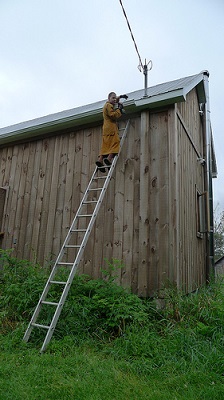
Why Is A Gutter Clogged? How To Unclog It The Right Way: a blog on how to unclog your gutters.
Why Is A Gutter Clogged? How To Unclog It The Right Way: a blog on how to unclog your gutters.
Introduction
Your gutters are a crucial part of the exterior of your home. They’re responsible for collecting rain water and channeling it away from the foundation of your house, which is why they need to be maintained on a regular basis. If you don’t take care of them properly, you could end up with a lot more water in your basement than necessary—or worse yet, mold! So what does all this mean? Well, let’s first talk about how a gutter works and then we’ll talk about how clogging can occur and what you need to do if that happens.
Water flows away from the gutter and out of the downspout.
The reason for this is that gutters are designed to collect rainwater, not debris. While you may not be able to see it at first glance, your gutters are actually very effective at directing water away from your house and into downspouts. The shape of the gutter directs rainwater toward these channels so that it can be directed out of reach and away from your home’s foundation.
Downspouts carry water far enough away from the house that it won’t cause any damage or flooding inside your home; however, sometimes leaves or other debris will get stuck in these downpipes and prevent them from functioning properly anymore. When this happens, there will be extra water pooling around where they meet with their respective roofs because nothing else is draining away that excess liquid anymore!
Clogged gutters can cause a lot of damage.
Clogged gutters can cause a lot of damage. Not only will your home suffer from water damage, but you might also have to pay for expensive repairs or replacements.
Gutters are one of the most important components in your house because they prevent rainwater from flowing down the walls and into your home. If they become clogged, then it’s likely that water will start leaking into places where it shouldn’t be–like through gaps between windowsills or door frames and onto floors inside your house!
Once this happens, mold can start growing on these damp surfaces which is both unhealthy for humans as well as damaging to their property value (you wouldn’t want someone else buying a house full of mold).
You’ll need to unclog your gutters frequently if you have a problem with leaves in the fall.
If you have a problem with leaves in the fall, you’ll need to clean your gutters more frequently. Leaves can clog your gutters and cause them to overflow or even break. They also have the potential to cause mold inside your home if they’re not cleaned out regularly, so it’s best not to let them sit there for too long!
Clogged gutters can cause mold to grow inside your home.
Clogged gutters can cause mold to grow inside your home. If you have clogged gutters, water will not be able to drain properly and will sit in the gutter for long periods of time. This causes water to become stagnant and humid, which is exactly what mold needs to thrive on.
Mold grows best in warm, humid environments with little air circulation–the same conditions found inside homes with clogged rain gutters or downspouts! When this happens it can lead to health problems like allergies or asthma attacks (if you’re allergic), structural damage like rotted wood around windows or doors (if there’s too much moisture), toxic spores released into the air when removing clogs so wear protective gear when doing so (such as gloves). Some people may experience negative reactions upon contact with these spores such as coughing fits due to irritation from dust particles floating around them while trying unclog their gutter system; however most symptoms go away once exposure stops altogether.”
You should clean out your gutters regularly, not just during the rainy season.
You should clean out your gutters regularly, not just during the rainy season.
The best time to do this is in the spring and fall when leaves are falling from trees and other debris is likely to be trapped in them. Be sure to wear protective clothing and eye gear for safety reasons.
Clean out any leaves or other debris that have collected in your gutter with a rake or broom before using a leaf blower or vacuum cleaner on it, as these tools can cause damage if used improperly. Then use an attachment on your hose (if one isn’t already included) to wash down any remaining debris from inside of it while being careful not to get water anywhere else on the exterior walls of your home!
Keep your gutters clean on a regular basis so they can work effectively in keeping your home dry and mold-free.
Gutters should be cleaned at least once a year. They should also be cleaned after a heavy rain, when leaves fall from trees, when ice and snow melts or after storms.
Conclusion
You should have your gutters in Toronto cleaned on a regular basis, not just during the rainy season. This will help keep them working at peak efficiency and keep your home dry and mold-free.
